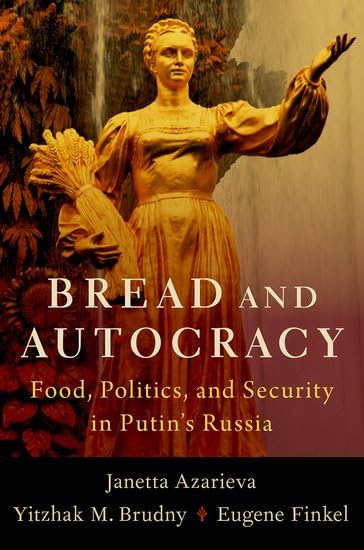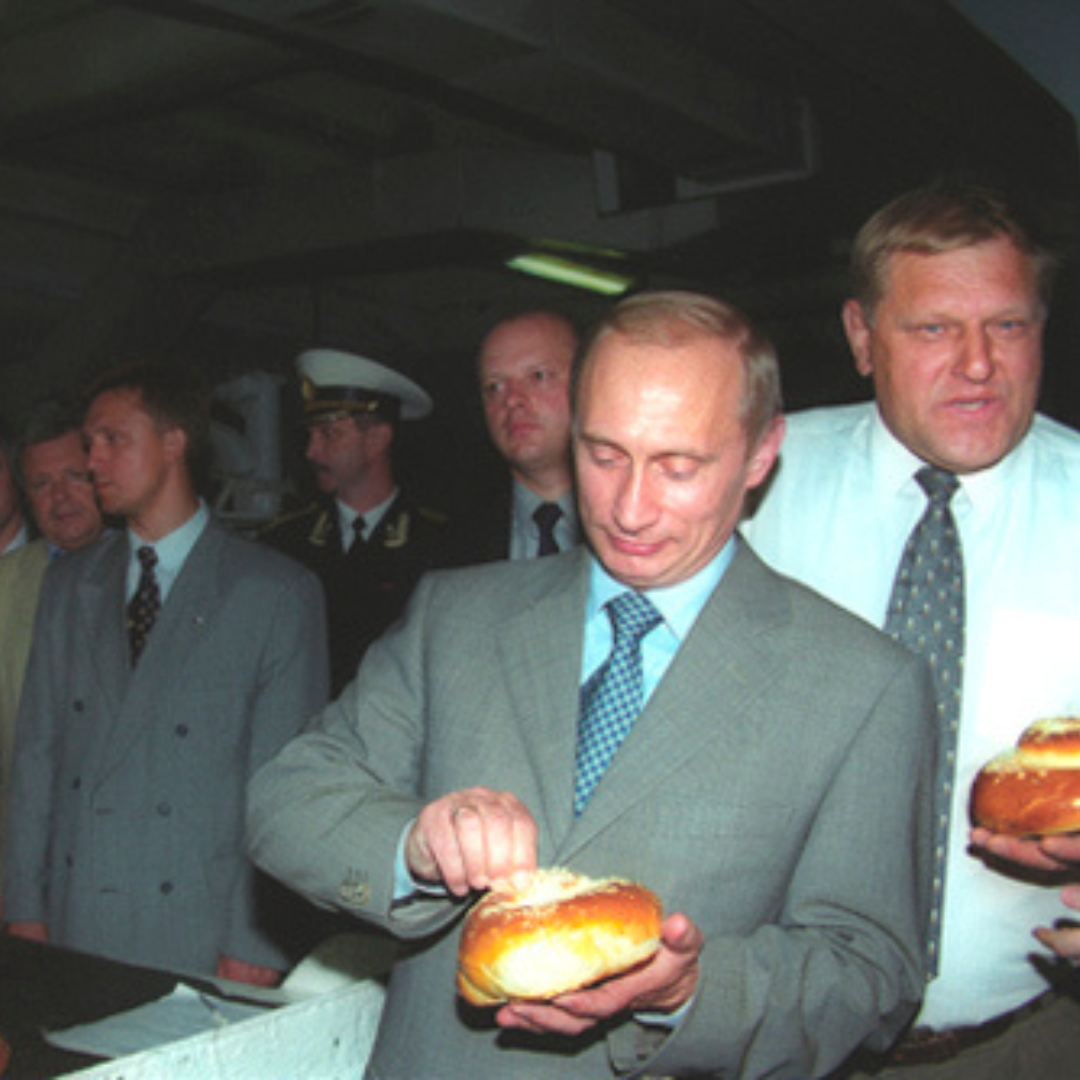Food independence in Putin's Russia

Published by: Oxford University Press

Few monographs written in English treat the politics of Russian food and agriculture as critical to Putin’s regime as does Bread and Autocracy: Food, Politics, and Security in Putin’s Russia.1 Azarieva, Brudny, and Finkel divide their study chronologically and thematically and provide a thought-provoking narrative on how these government policies were formed and implemented. To illustrate the importance of food to Russian stability and security, they address the food shortages during the waning years of the Romanov dynasty as well as the critical food issues within Russia in the Soviet Union and the Russian Federation. They then turn to the current regime, its agro-industrial complex, its responses to sanctions, COVID-19, and the conflict in Ukraine along with an insightful conclusion and an outlook on the future of Putin’s regime from the context of food politics and security. The seventh chapter provides insightful and intimate overviews on the largest and most heavily subsidized agroholdings within Russia: Agrocomplex, Russagro, and Miratorg. Informative chapter endnotes and a well-researched bibliography complete the monograph, making it an excellent introduction to a complex topic that has importance beyond contemporary Russia.
The authors argue that food-centered import substitution is a key pillar of Putin’s regime. Shifting from the importation of grain during the waning Soviet years and the early years of the Russian Federation to the exportation of grain, meat, dairy, and other foodstuffs was a deliberate government strategy designed to protect the regime from Western sanctions and project an image of food security and sovereignty to both citizens and the world community. The Food Security Doctrine (FSD) of the Russian Federation in 2010 solidified this strategy by making food and food production an issue of national security by setting quotas for each agricultural staple.
Initially, the FSD incorporated ideas from across the political spectrum. Despite this initial political pragmatism, Bread and Autocracy asserts that the conservative reasoning of Aleksi Gordeev (also Gordeyev), Minister of Agriculture from 1999-2009, laid the groundwork for import substitution as a guiding force of the FSD. Gordeev’s early influence on food politics and security has abided through several iterations of the FSD.
During the waning years of the Soviet system to just prior to the FSD’s adoption in 2008, many staples were produced either by the large state agrobusinesses or smallholder production, which continues under Putin’s regime. Until recently, potato and vegetable production on dacha (small-private plots) surpassed the kolkhozy and sovkhozy (larger agricultural enterprises), and meat and poultry production were not far behind. Only in grain did the former agricultural enterprises surpass small plot yields.2 The FSD’s adoption two years later started to slowly shift this situation, yet a symbiosis remains between agrobusiness and smallholder production.3 This tenuous stability, coupled with the unpredictability of grain growth is a reality that no doctrine can anticipate, regardless of Russian claims of self-sufficiency and nationalism.
Ignorance of Putin’s food policy and security does the West no favors in considering political and trade strategy with Russia.
Although Bread and Autocracy covers many areas of food politics and security well, a discussion and analysis of the turn of Russian political and military elites towards a nationalist perspective that embraces a Eurasianist ideology would have been beneficial in discussing food politics and security. Under Putin’s regime, Eurasian political ideology has influenced agricultural policy in the latest form of the FSD. The authors do make a passing reference to the 2020 iteration of the FSD, which repeatedly mentions the Eurasian Economic Union (EEU) as the new model of trade (eschewing reference to the World Trade Organization). Yet a deeper discussion of Eurasian ideology and even the strains of messianic nationalism that undergird Russian political behavior could help Western readers understand some of the extreme (and often contradictory) ideological underpinnings and political beliefs that drive food policy and security in contemporary Russia.4
Ignorance of Putin’s food policy and security does the West no favors in considering political and trade strategy with Russia. Last year, the United States’ collective ignorance was acutely on display to the world as a western media pundit marveled at the selection and low prices of Russian foods (among other things) during a trip to interview President Putin.5 Readers of the western press and viewers of the associated video clips were treated to an American perspective naïve to the reality of Russian food politics, which includes ideological perspectives peculiarly paradoxical to the Western intellectual tradition and intrinsically seductive to contemporary Russians. While western media disputed and overtly mocked the observations expressed by the political commentator (and rightly so), the deeper policy decisions and trade disputes of Western governments and Russia were ignored, and the deeper ideological foundations of Russian messianic nationalism and Eurasian trade remained overlooked.6
The authors of Bread and Autocracy have written an accessible monograph that invites the reader to consider the globally critical and yet inherently fragile topic of agricultural production within Russia. Food (and its scarcity) are a catalyst in Russian history, and this work fills a gap in contemporary knowledge about Russian food politics and security. Though the authors focus less on everyday Russian perceptions about food and food security (and how nationalism affects those perceptions), their efforts elucidate an area where few English-language publications make complicated issues engaging and informative.
Jason A. Reuscher is an associate librarian with the Pennsylvania State University Libraries. He holds an MLIS and an MA in History, and his research involves the transcription and translation of culinary manuscripts from Kurrentschrift to modern German and English. His ongoing efforts can be found here: sites.psu.edu/dieseskochbuechs1768/ and sites.psu.edu/klosterrezepte/.
1 For a comparable study in English, see Stephen K. Wegren, Alexander Nikulin, and Irina Trotsuk. Food Policy and Food Security: Putting Food on the Russian Table. NY: Lexington Books, 2018.
2 Data from the Federal Service of State Statistics, Russian Federation, 2009 in A Geography of Russia and its Neighbors, Mikhail Blinnikov (New York: The Guildford Press, 2011), p. 304.
3 Oane Visser, et. al. “‘Quiet Food Sovereignty’ as Food Sovereignty without a Movement? Insights from Post-socialist Russia,” in Politics of Food Sovereignty: Concept, Practice and Social Movements, eds. Annie Shattuck, Christina Schiavoni, and Zoe VanGelder (New York: Routledge, 2017), 96-7.
4 For a current look at the history and influence of the Eurasianist movement, see Gary Saul Morson’s piece, “Russian Exceptionalism.” New York Review of Books, Volume LXXI, Number 3 February 22, 2024.
5 Graeme Wood, “What Tucker Carlson Saw in Moscow,” The Atlantic, February 16, 2024.
6 Rachel Dobkin, “Tucker Carlson Mocked for Praising Russian Grocery Stores,” Newsweek, February 15, 2024. Also: Laura Parnaby, “Tucker Carlson mocked for fawning video praising Russia’s ‘cheap and fresh’ groceries without mentioning how average salary is a SIXTH of US income,” Daily Mail Online.
